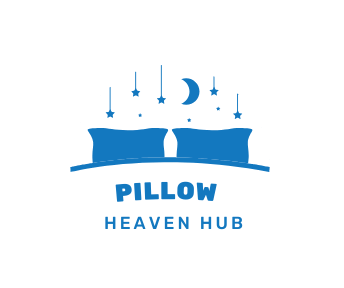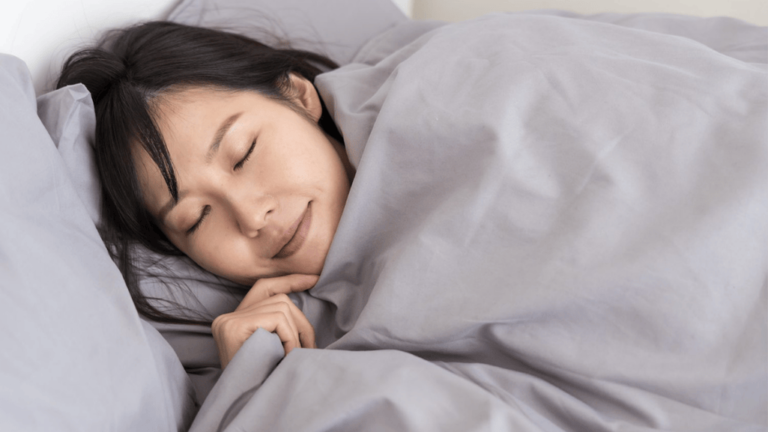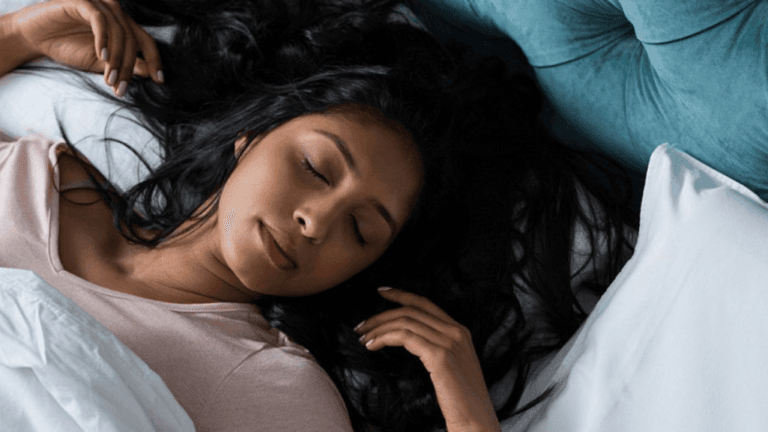In New York, sleep experts are looking closely at sleeping without a pillow. They’re exploring if it might be good for health. This debate is part of a wider discussion on the best ways to sleep. Some believe that ditching the pillow could help with back, neck, and stress issues.
Some say sleeping without a pillow can lessen headaches and face acne. But, the benefits are not the same for everyone. It depends on how you normally sleep. If you sleep on your stomach, it might help with your back. But side-sleepers need a pillow to keep their spine straight, according to the University of Rochester Medical Center. Though interesting, solid studies supporting sleeping without a pillow are lacking.
Key Takeaways
- Foregoing a pillow may offer relief from back and neck pain, headaches, and even stress for some.
- Side sleepers are advised to use a pillow to avoid potential harm due to misalignment of the spine.
- Stomach sleepers could benefit from sleeping without a pillow, improving spinal posture and reducing strain.
- Sleeping without a pillow is a subject of ongoing research, primarily focusing on spinal alignment rather than comprehensive health effects.
The individual’s comfort and health condition should guide the choice of sleeping with or without a pillow.
The Potential Benefits of Pillowless Sleep
Looking into the benefits of sleeping without a pillow shows some interesting things, especially for stomach sleepers. If you sleep on your stomach without a pillow, it might help your spine to stay in a better position. This could lower the strain on your neck.
May Improve Spinal Alignment for Stomach Sleepers
People who sleep on their stomachs might put less pressure on their neck and back if they don’t use a pillow. Sleeping this way can make the spine line up better naturally. It stops the neck from bending upwards too much, something that happens with pillows.
Potential Reduction in Neck Pain for Certain Sleepers
Not using a pillow could lower neck pain for some. It does this by not forcing the neck to stretch too much. By letting the neck relax, the pressure moves more evenly across the spine. This might really help if your neck often feels stiff or hurts.
Enhanced Sleep Quality Through Better Posture
Adjusting to sleep without a pillow can help in a few ways. It can make your spine align better and could make you sleep more soundly. With your spine in the right position, breathing can be smoother. This could lessen how often you wake up during the night.
If you’re thinking about giving up your pillow, there are a few tips to keep in mind. It’s advised to place a pillow under your stomach or pelvis for better spine support. Also, picking a good, supportive mattress is key. It helps ensure your body is well taken care of even without a pillow.
Learning more about sleeping without a pillow is wise if you want to try it. If you want to know how taking your pillow out might impact your sleep, check out this detailed guide.
Understanding How Pillows Affect Sleep Posture
Pillows play a huge part in how we sleep, but we often forget their importance. They help keep our neck and body in line. This is key for a healthy spine.
Sleeping without a pillow isn’t good for everyone. If you sleep on your back or side, not using a pillow might hurt your neck and spine. This could make you feel stiff or sore when you wake up. But, for those who sleep on their stomachs, no pillow could be better. It might help the back stay flat, which is good for the spine.
Let’s explore how sleeping positions affect our use of pillows:
| Sleep Position | Pillow Impact | Recommended Pillow Type (If Necessary) |
|---|---|---|
| Back Sleepers | Need a pillow to keep the neck aligned and reduce snoring. | Choose a medium-high pillow that’s firm. |
| Side Sleepers | It’s important for keeping the head and spine in a line, and to ease shoulder pressure. | Use a high loft, firm pillow for best results. |
| Stomach Sleepers | A pillow might stress the spine less, or you could put one under your pelvis to help posture. | A soft or low pillow, or none at all, is best for stomach sleepers. |
Skipping the pillow can sound good for your skin and hair. But, it’s smart to start with something small, like a thin pillow or a folded blanket. This ensures your body is comfy and supported.
Having good sleep habits and finding the best pillow for you is vital for your health. Healthcare pros can help figure out what’s best for you. They can tell you if going pillow-less is a good idea or not.
Changing how you sleep can improve your sleep quality. This means looking into whether you need a pillow or not. Remember, everyone is different. Choosing what works for you is what matters most.
Examining the Link Between Pillows and Sleep Quality
Thinking about sleeping without a pillow advice is important. It’s about the effects of sleeping without a pillow on sleep. Pillows bring comfort and help keep our spine straight. This affects how well we sleep.
Pillow Materials and Their Impact on Sleep
What a pillow is made of is key for good sleep. Memory foam and latex match our body’s shape. They offer a lot of support and help ease pain. But, feather and polyester pillows don’t give as much support. This can make us feel uncomfortable at night, making us wake up often.
The Influence of Pillows on Sleep Depth and Consistency
Knowing about the best sleeping positions without a pillow is crucial. The right sleep position, with help from a perfect pillow, can stop us from waking up at night. It can also help us enter the deep, restful REM sleep. This greatly improves how well we sleep.
How Pillow Usage May Affect Sleep-onset Latency
Another big part in learning about effects of sleeping without a pillow is how it affects falling asleep. With a bad pillow, it might take longer to fall asleep. A great pillow makes us comfortable and keeps our neck in line. This helps us fall asleep faster and easier.
So, choosing to sleep with or without a pillow depends on what feels best for you. But, pillows do more than just make us comfortable. They have a big influence on how much sleep we get, and the health and quality of that sleep.
Analyzing Cases: When is it ok to sleep without a pillow
The topic of sleeping without a pillow comes up a lot. It’s different for various people based on their health and what feels comfortable. The best way to sleep without a pillow depends on you and your needs.
For those who sleep on their side, not using a pillow can cause their head to fall. This can make your neck sore. But, using a body pillow can help.
It supports your shoulder and hip, which is good for sleeping on your side. This keeps you in a better position all night. It can really improve how well you sleep.
If you have sleep apnea, how you sleep can make a big difference. Research says sleeping on your back is worse than on your side for this condition. Using a pillow to support your side when you sleep might help.
Side pillows can also help with snoring. They keep your airways clear and can cut down on how much you snore. The numbers show it can make a big difference in how often you snore.
Some people feel better lying on their stomach without a pillow. But this isn’t always the best choice. It can cause problems with your back and might lead to pain. It’s smart to talk to experts for the right advice on how to sleep well. Sites like Rise Science can offer helpful information.
In the end, knowing if it’s okay to skip a pillow depends on your own situation. Think about what’s right for your body. It’s always good to check with people who know a lot about sleep and health.
The Health Risks of Sleeping Without a Pillow

Exploring sleeping without a pillow shows many health risks. These might be more important than we think. Knowing these risks is key for people not advised to sleep pillowless.
Potential for Poor Posture and Resulting Pain
Sleeping without a pillow can harm your posture. It especially affects side and back sleepers. This can hurt your neck and back, causing pain and maybe lasting issues. It’s very important to keep your body aligned well when you sleep.
Neck Strain and Associated Discomfort in Side and Back Sleepers
Sleeping without a pillow makes neck strain worse for side and back sleepers. Lack of support hurts your neck muscles and ligaments, leading to stiffness and pain. Morning aches could become a big health problem for you.
Could Sleeping Pillowless Exacerbate Pre-existing Conditions?
Nap time could get really tough for folks with neck or back problems like spondylosis or scoliosis without a good pillow. Doctors say they need a supportive pillow. This helps the spine stay healthy.
- Poor posture leading to muscle and joint pain
- Increased risk of long-term neck issues
- Exacerbation of existing spinal conditions
Finding out about pillowless sleep effects is crucial. It helps those who want to better their sleep health. For most people, using a pillow is better, especially if you sleep on your side or back. It keeps you healthy and comfy all night.
Is a Pillow Necessary for Sleep: Insights from Sleep Experts
The debate on sleeping habits without pillow has health professionals sharing different opinions. We can find help in the guidance of sleep experts. They mostly agree that using a pillow is good for sleep for many people. But, there are occasions, like some sleeping positions, where a pillow might not be needed.
Medical Professionals’ Perspectives on Pillow Usage
Medical experts say choosing to sleep without a pillow could be right for some individuals. This choice could depend on health issues too. While some studies and doctors, like Dr. Troxel, share positive results for certain ways of sleeping, more research is needed. For instance, sleeping on the stomach without a pillow might lessen back and neck pain. It helps the spine stay in line better.
But, not using a pillow could worsen sleep problems like sleep apnea or sinus issues. This shows how complicated the choice can be and why personalized advice is crucial. Best sleeping positions without a pillow changes with each person’s health needs.
Sleep Specialist Recommendations for Various Sleeping Positions
Sleep experts suggest different pillows for varied sleeping types. They say side sleepers need a firm pillow to align their spine. Back sleepers should choose a medium-firm one to keep their neck and head in a good position. On the other hand, stomach sleepers might feel best with a super flat pillow or none, to prevent neck strain.
Deciding to sleep without a pillow is based on what feels comfortable and keeps you healthy. It’s about fitting your sleep set-up to your own body and needs, not just following general advice.
In conclusion, not using a pillow could be beneficial for some, like those who sleep on their stomachs. Yet, it’s important to weigh the pros and cons. Talking with your doctor is a smart move. They can help you make choices that are good for your sleep and your health.
The Psychological Impact of Pillow Use: Stress and Sleep Disturbances
Looking at how pillows and sleep troubles are linked is key. The choice to sleep with or without a pillow affects not just comfort but also how we feel. Bad pillows can cause tossing, turning, bad sleep, and more stress. But some people get better sleep and less stress without a pillow.
Everyone has different pillow experiences, affecting health in various ways. Stress and sleep problems feed off each other. Sleeping without a pillow can mean less or more stress, depending on the person.
Recent studies show mixed results on pillows. Some with uncomfortable pillows are more stressed because they sleep badly. But for a few, ditching the pillow means better sleep and less stress. The effects depend on health and habits.
More than half of people wake up stressed from some pillow types. Research also hints that not using a pillow could help blood flow and sleep apnea, reducing stress from physical causes.
Choosing to use a pillow or not can affect stress and sleep. Some thrive without a pillow, but others need it for better sleep and less stress. This choice depends on personal health and comfort, showing the need for personal sleep solutions.
- Poor pillow quality often correlates with sleep problems and stress.
- Conversely, removing the pillow might reduce stress by promoting better sleep.
- It’s wise to talk to a doctor about how a pillow affects your health.
In short, pillow use can affect stress and sleep in different ways for everyone. It’s important to get advice that fits your health and habits. Finding the right balance can lead to better mental and physical health.
Pillowless Sleeping: What the Research Says
The talk about the benefits of sleeping without a pillow continues. Current evidence shows not everyone will feel these benefits the same. Some might like how it takes pressure off their shoulders and helps with back pain. This could be because sleeping without a pillow could make blood move better and lower the chance of sleep issues like allergies or snoring.
When looking at the effects of sleeping without a pillow, comfort and health needs are key. The University of Rochester Medical Center says no pillow might be good for stomach sleepers. It suggests it may help keep the spine straight, easing strain. But, it might not help side or back sleepers since a pillow keeps their head, neck, and spine in line. Claims that not using a pillow lessens wrinkles and helps hair need more study to be sure.
Experts suggest a personalized approach to trying pillowless sleep. They say it’s better to slowly use less padding under your head. And, it’s vital to keep your body’s alignment right. People with acid reflux or sleep apnea might need pillows for comfort and health. Talking to health professionals can help find the best balance for your sleep needs and health.









